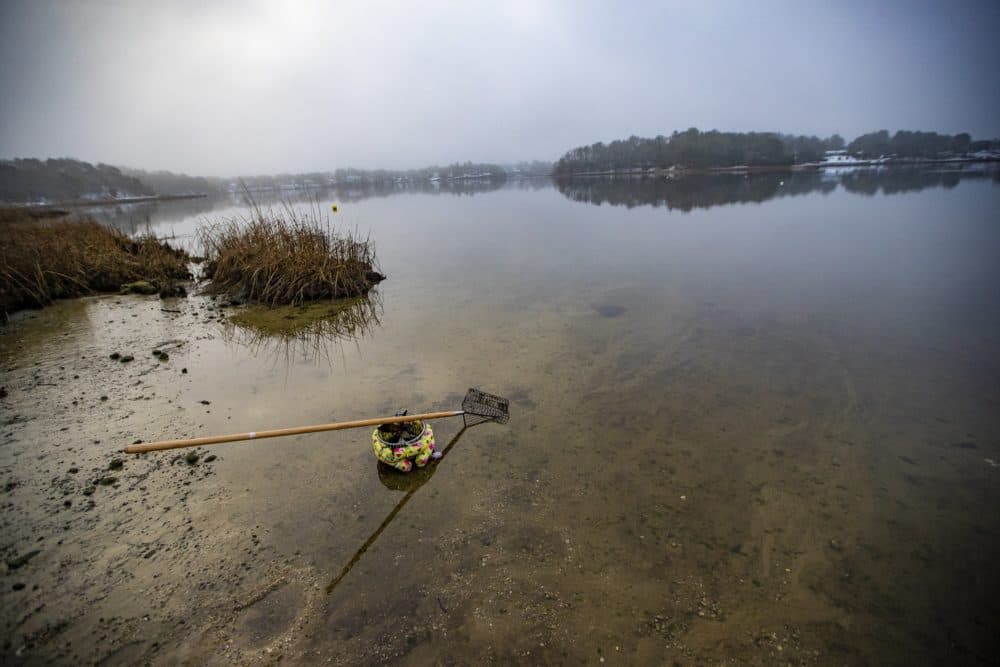Advertisement
Lawsuit Aims To Protect Cape Cod Waters From 'Putrid Smells And Unsightly Scums'

The nonprofit Conservation Law Foundation (CLF) has filed a lawsuit against the Massachusetts Department of Environmental Protection (MassDEP) and the towns of Barnstable and Mashpee for failing to protect coastal waters from pollution. The lawsuit alleges that nitrogen pollution from septic systems has damaged the coastal ecosystem, and that local and state officials — despite knowing the source of pollution — have not sufficiently addressed the problem.
"Defendants were bound by the law of the Commonwealth to implement and enforce the mandatory legal requirement that these systems be upgraded to end their pollution, as well as to prevent the further installation of failing septic systems,” the CLF lawsuit states. “Defendants have failed in this duty.”
CLF is asking the court to suspend the installation of any new septic systems in the two towns and order the defendants to submit a plan to upgrade or replace polluting septic systems.
The nonprofit has worked on a number of other lawsuits focused on nitrogen pollution on the Cape, but this is the first to focus on the enforcement of state law, rather than federal violations, said Christopher Kilian, vice president of Strategic Litigation at CLF.
“The first necessary step is to stop using the thing that we know is causing the problem,” Kilian said. “It’s time to draw that line.”
Septic systems are a widely acknowledged water pollutant in Cape Cod. In 2015, the Cape Cod Commission — the state’s land planning agency for the Cape — published the Cape Cod Area Wide Quality Management Plan Update outlining strategies to combat the rapid decrease in Cape Cod’s water quality and marine ecosystems, writing: “The problem is nitrogen and the largest controllable source is the septic systems used every day.”
The lawsuit argues the defendants’ failure to act has created an “ecological crisis” off the southern coast of Cape Cod leading to toxic algal blooms and killing swaths of eelgrass — a valuable and productive marine habitat. CLF noted in the lawsuit that "rotting detritus starves the seafloor of sunlight, and algal blooms offer only putrid smells and unsightly scums."
Water pollution also threatens the Cape’s economy. Coastal tourism and commercial and recreational fishing bring in more than $1 billion to the local economy, according to a 2020 report from the Association to Preserve Cape Cod. But, according to the lawsuit, “decaying algal blooms prevent these waters’ human beneficiaries from using” the waters.
Advertisement
“People come to the Cape from throughout the world because of its amazing natural resources and water quality,” Kilian said. “The unfortunate reality is that we’re killing the goose that laid the golden egg.”
MassDEP has received a copy of the CLF complaint and is currently reviewing it, a spokesman for the department told WBUR in an email.
The MassDEP spokesman said that Cape communities have made substantial progress since the 2015 plan in developing and implementing solutions to the Cape’s water quality challenges. However, according to the Association to Preserve Cape Cod report, the percentage of ponds and bays with “unacceptable” water quality has increased in recent years.
Kilian said CLF is hopeful MassDEP and the towns will take action that could rectify the problems. If not, CLF is prepared to press the case to hearing and fully litigate it because the people who care about water on Cape Cod have “nothing to lose.”
“If we’re right and the law says what it says, then we actually might see progress,” Kilian said. “It’s time to have that fight because the waters are in terrible shape.”
